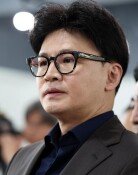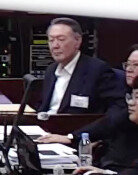Failure to appeal to younger voters
Failure to appeal to younger voters
Posted April. 29, 2011 05:51,
Voter turnout at Wednesday`s by-elections was surprisingly high at 39.4 percent. In particular, the turnout at the Bundang B-constituency in Seongnam, Gyeonggi Province, was 49.1 percent, higher than that of the general elections three years ago when the combined turnout of Bundang A and B-constituencies was 45.2 percent. Wednesday`s high turnout was largely thanks to people under 40, who accounted for two-thirds of the voters. They showed their presence by voting either before or after work. Exit polls conducted by the Korean news network YTN showed that 58.2 percent of those in their 20s, 72 percent of 30-somethings, and 68.6 percent of those in their 40s in the Bundang B-constituency supported the opposition Democratic Party candidate Sohn Hak-kyu. Given that the gap between Sohn and the runner-up, the ruling Grand National Party`s Kang Jae-sup, was merely 2.7 percentage points, voters in their 20s, 30s and 40s were a decisive factor.
The ruling party feared that those in the three age groups might vote in the by-elections. It is nonsense that the party wanted to win Wednesday. How can it expect to win next year`s general and presidential elections without winning the hearts and minds of those under age 40, who account for 63 percent of all eligible voters? If the ruling party wants to survive by relying on the middle-aged or elderly, wouldn`t the two age groups want to turn their backs on the party for such cowardice?
Just forty months have passed since the 17th presidential election, when then candidate Lee Myung-bak of the Grand National Party defeated the Democratic Partys candidate Chung Dong-young and dominated in all voter age groups. Lee would never have been elected without the support from voters under age 40.
Those in their 20s, 30s and 40s are relatively free from regional bias than their parents` generation, who moved from the provinces to Seoul. They are conservative and selfish in economic issues but willing to accept change in politics. They are familiar with the Internet and social networking sites and tend to keep changing their minds, switching between conservatism and liberalism. How hard did the ruling party work to appeal to the younger generation in each area? In this respect, opposition parties had a more realistic and communication-focused approach than the ruling party.
Many values and virtues must be protected for the sustainable development of a nation and its people. Conservatism for the betterment of the nation based on free democracy, market economics and the rule of law is critical. So why has the Grand National Party failed to communicate with and gain consensus from the younger generation on such fundamental issues? Because party members are merely interested in getting nominated for the next elections and obsessed with party factions, few voters see them in a positive light. If the ruling party is seen as a special interest group focused on splitting the bounty of power, the younger generation will see it not as a partner for hope but something to be removed.
The Grand National Party must change internally since it cannot revive by simply changing its exterior. Party members whom the people dislike should disappear. Stagnant water is bound to go bad. There is no major trend in domestic elections. Those who seemed likely to win lost in the by-elections. Since the people are weak as individuals, they often turn the tables on politicians in elections. Korea could follow in the footsteps of Japan, which saw its once powerful Liberal Democratic Party shrink from 300 seats to 100 while the Democratic Party of Japan grew from 100 seats to 300.



![[단독]김경 “1억원 줄때, 강선우도 함께 있었다” 자수서](https://dimg.donga.com/c/138/175/90/1/wps/NEWS/IMAGE/2026/01/14/133148772.5.jpg)


![반찬통 착색 고민 끝…‘두부용기’ 버리지 말고 이렇게 쓰세요 [알쓸톡]](https://dimg.donga.com/c/138/175/90/1/wps/NEWS/IMAGE/2026/01/09/133126593.3.png)
